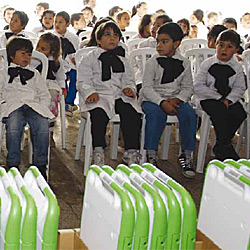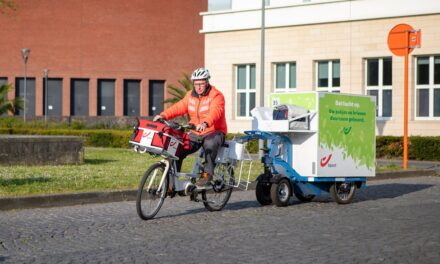
From Uruguay to the Universal Postal Union?
(Continued from page one):
“We know that the trends in the world for letters are decreasing. We need to prepare for parcels and e-commerce,” she says.
“We are working very hard with governments to explain the situation, and the necessity for the operator to develop new products.”
Leadership
At a global level, Bassini believes that the UPU must take the lead in this area. ”For me, the UPU is a key player in the future of the sector, but it will depend on the Union’s ability to identify the society’s need to innovate. We need to anticipate what the customer needs, what’s happening in the electronic world and e-commerce, for example.”
One of the notable successes the PUASP is having at present in its work with governments is its promotion of the Exporta Facil programme, which seeks to boost national exports by making it easier for small businesses to ship products across national borders. The programme started out in Brazil in the late 1990s, but has since expanded to Peru, Ecuador and Uruguay among others.
Recently, the PUASP ran a workshop to look at the progress of the project, and Bassini says it was clear there have been good results so far.
”We are very pleased with this initiative,” she says. “Governments see these projects, and they can visualise the real importance that the postal sector has for the economy of their countries.”
Working on cross-border issues is also key to improving the security and safety of the global postal network, another area where Bassini believes the UPU needs to play a big role.
Integration and co-operation within the UPU
Bassini also wants the Universal Postal Union itself to improve its own integration. It is sometimes overlooked, she believes, that smaller nations often do not have the resources to follow, let alone contribute to, everything going on within the Union.
When the world’s postal operators convene in Doha next year, the smaller nations cannot take legions of staff to engage on every single issue. Bassini contends that more needs to be done to open up the activities within the UPU to those smaller members, starting with an improvement in communications within the union.
“The UPU should be an organisation that integrates all the parts: sharing experience, listening to all the different thoughts of the postal operators, and trying to plan a common future,” she says.
At a policy level, she believes more integration is needed to better serve the international universal service obligation, though it is not an easy issue to tackle. For instance, grappling with the thorny challenge of terminal dues has been difficult within the UPU.
How to bring together countries of differing economic power and efficiency in order to provide affordable and universal international mail services?
Bassini suggests a better system may be needed, where resources are shared so that national postal operators can link up to provide an international network that might compete with the large integrators on a global stage.
”If we continue with this system, we probably won’t be competitive,” she warns. “I know this problem very well through the PUASP. Our region is very concerned with this issue. We need to work very hard on this.”
Social development and the posts

Project Ceibal has shown the importance of Uruguay’s postal service in promoting social development
Bassini’s message of inclusion for the UPU is perhaps reflective of a general attitude within Latin America at the moment that postal operators should be more than merely a communications service, they should be a positive force for change, driving social development.
Her message to governments within Latin America, through the PUASP, has been that opening up postal operators to provide additional services, for example financial services, can have a powerful effect on improving the quality of life for citizens.
This message is really hitting its mark at the moment with governments, perhaps because the region’s administrations tend towards the social democratic end of the political spectrum.
An interesting project underway in Uruguay called Project Ceibal has seen Uruguayan Post distributing computers to teachers and students, to spread education and development outside the urban areas of Montevideo. As well as delivering computers, postal operators can manage returns and repairs.
Explains Bassini: “It is one example of how the postal network can contribute to the social development of the people. Uruguay is now providing a lead for the other countries of the region, and we will soon see similar projects in countries like Costa Rica.”
As well as using the postal infrastructure to expand computer penetration within developing countries, Bassini has been courting the mobile telecommunications industry, to show how postal operators can support efforts to expand coverage of mobile phone technology.
She says: “Meeting with the international union of telecommunications, it was clear they have problems delivering their technology in our region, but they could not visualise the importance of the role of the postal sector. I am convinced the postal sector has a role to play in future. The postal network is the biggest network in the world.”













